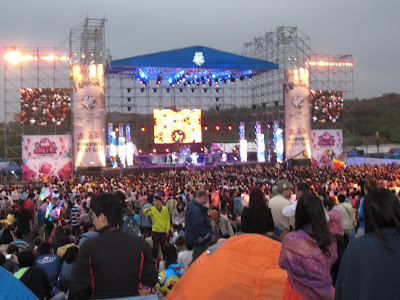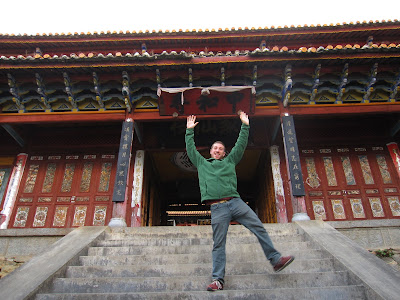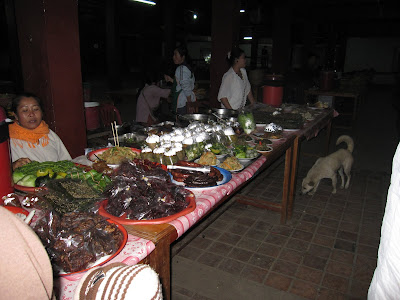Okay it’s been three months, time to leave China. According to my visa, I can stay in China for one year as a tourist but I must leave the country every three months. I don’t quite understand the rationale behind this but I’m glad to live in a region of China where I can easily cross the border by bus. My first visa run happened to coincide with the Chinese New Year and since the entire country takes a vacation, I decided to take this same opportunity. I conceived of a vague plan that involved traveling over land through Laos into the north of Thailand, where I was looking forward to experiencing life in Chiang Mai before continuing my travels in Northern Thailand with Julie and Kate (two close friends from my study abroad in China, also featured in my previous blog post).
This was the first time I’ve truly traveled on my own in Southeast Asia. I liked it a lot. I felt all my sensory receptacles open alert and ready to receive the people and landscape around me. It was just me and them. For better or for worse there was no buffer to distract me. I could, of course, choose when I was ready for company and when I was in the mood to soak in the experience on my own. In fact, I controlled the entire trip but allowed myself to be equally available to the range of possibilities surrounding me.
I began on a night bus from Kunming to Jinghong, in the south of Yunnan Province. Jinghong is the capital of Xishuangbanna Dai autonomous region, home to Yunnan’s Dai minority people and China’s bio-diversity. I fell asleep in three layers of clothes and woke up to palm trees and a tropical climate. The bus arrived in the dark at a little before six A.M.. In China the whole country is set to the same time zone, so it would be at least another two hours before the sun actually rose. From my previous experiences on sleeper buses, I had hoped the bus driver would allow the passengers the last few decent hours of sleep to successfully make it through the next day. Unfortunately in my sleepy sweaty state, I was awoken and asked to get off the bus.
I latched on to a group of five Polish travelers also looking for a hotel to finish their sleep. We walked together to a nearby spot and I passed out in a single bedroom. When I awoke the sun was out; I was ready to spend a day walking around the city and plotting my next move into Southeast Asia. Many cafes in Xishuangbanna double as travel agencies to help visitors find treks in the area. I learned that the cheapest fastest approach to Thailand would be via the China-Laos border to a Laotian destination called Luang Nam Tha. From there I could take another bus to the Thai border, where there would be rickety wooden speed boats waiting to bring tourists across the Mekong River into Thailand. This sounds long and it was a lot of traveling but this route attracts many tourists and from Jinghong into Thailand I never felt alone.
From Jinghong to Luang Nam Tha, I found a friend Kevin from the US on a gap year before college. I had met Kevin at a café and we chatted for a little both discussing travel possibilities and the next morning we both were waiting for the bus to go to Luang Nam Tha. We had assigned seats on the bus and I ended up next to a young Chinese women, excited about embarking on an adventure in Laos. We really hit it off, so much so that every time she wanted to tell me a secret about someone on our bus she squashed me in my seat to get closer to my ear. That night in Luang Nam Tha I had options of friends to hang out with: there was Kevin and a German friend he made, and my Chinese friend and her posse. I ate snacks with the Chinese crew at the night market and then had a fresh mango smoothie across the street with Kevin and his friend.
At the Chinese border crossing with my bus mate:

The bus waited for us as we paid for our Laos visas:

Laos border crossing, slightly smaller than the Chinese one:


Luang Nam Tha night market:
The next morning, I connected with an Israeli couple from my bus from China and we piled into a minivan to the Laos-Thai border. Once in Thailand, there was one final leg, another minibus to Chiang Mai. Behind me in the van, I heard the lively sounds of Aussies and mentally decided they would be my go-to crew to find a guest house once in Chiang Mai. We arrived in Chiang Mai at night, but the bus dropped us off at the night market, where artificial lights allowed tourists to shop throughout the night. Coming from Laos, it was entirely overwhelming to arrive in a bustling outdoor shopping mecca. The four Aussies were feeling the same shock and they offered to find a way out. We all ate dinner together then found a decent hostel for the night.
View from Laos side of the Mekong River overlooking Thailand:

Boat driver across the Mekong:


I woke up that next morning ready to navigate the city on my own. I went looking for an inviting guesthouse and after settling into one, I began exploring. I was on my own in Chiang Mai for about five days before Julie and Kate came to meet me. In that time, I found a delicious vegetarian Thai restaurant with a female boss who taught cooking lessons. In the course of a long morning, myself and two other American women went to the market and learned how to make fourteen different Thai dishes. After such a phenomenal experience with this class, I signed up for a two day Thai massage class. Fortunately, the other students were three lovely German girls my age and together we studied the basics of an hour long Thai massage. Back in China I’ll have to practice these skills so I can come home with new valuable hobbies. Besides these classes, I explored the wats throughout the city and up on the nearby mountain, took yoga classes, and became acquainted with the local restaurants near my guesthouse.
Important lesson on peppers- these peppers are just vegetables the smaller more concentrated peppers are spicy and the staple ingredient for Thai foods:

Basic ingredients for all Thai soups:


Mushrooms called tree ears:
When Kate and Julie arrived I was ready to see more of Northern Thailand. The three of us, took off north to Chiang Rai, Mae Salong, a Chinese tea village, and finally stayed three nights in Pai. It was definitely different to share the company of two wonderful friends. All of the sudden, I could unload all my thoughts. Together we were non-stop chatting and laughing. My awareness had obviously narrowed but I felt lucky; I could experience new places with close friends. I'll use pictures to summarize some of what we did and saw:
Going down the rabbit hole....Mae Salong deserted tea plantation:


Wat at the top of the mountain, 718 steps to the top:

Our bungalow in Pai:

We biked to a waterfall and cooled down from the heat:
Thailand is a beautiful country but the culture feels much more transient than China. In China, when I say I plan to live in Kunming for about a year people’s nods convey how short they view my stay. Whereas in Thailand when I told people I was living in China for a year they were awed.
After eighteen days of travel, it’s comforting to return back to an apartment that feels like a home and a life that I am eager to continue. I flew back from Chiang Mai to Kunming on the night of the 15th. In a mere hour and a half I was back in Kunming and thirty minutes later I was snuggled up in my bed.































































